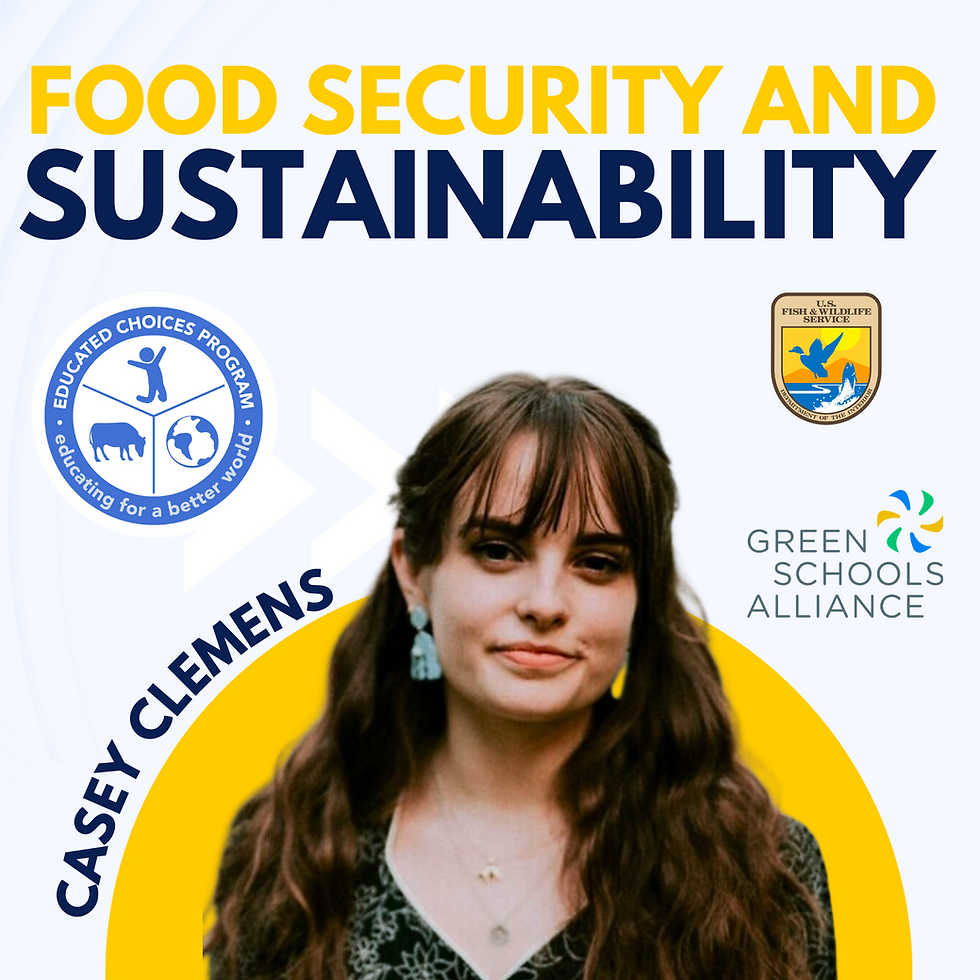The Balance Between Urgency and Hope
- bethchampion
- Apr 9, 2024
- 3 min read
Updated: Apr 9, 2024
Reflections from the Green Schools Conference
by ECP's Chief Development and Partnerships Officer Karyn Knox

I once heard the quote, “Education is our passport to the future, for tomorrow belongs to the people who prepare for it today.” These words have further fueled my commitment to ECP’s mission to provide science-based education about the impact of food choices, empowering current and future consumers and leaders to help create a healthier, more sustainable food system for all.
I had the honor of spending the week at the Green Schools Conference in Santa Fe, NM, among an incredible group of teachers, school and district officials, as well as other non-profit organizations that are also dedicated to preparing not only future generations, but the places in which they learn. Nationwide commitment to these initiatives was evident as representatives from across the United States strategized and collaborated on ways to reduce the carbon footprints of schools, make learning environments healthier, and alleviate climate anxiety by empowering young people to work alongside adults to help solve our global environmental crises. This powerful conference was hosted by The Center for Green Schools at USGBC and the Green Schools National Network (GSNN).
Discussions and learning opportunities were interactive, and the theme was the open sharing of resources. Our valued partners, Subject to Climate, discussed the availability of free educational resources such as ours and the critical role they play in holistic sustainability within schools, and Dream in Green led a discussion regarding climate anxiety and how we, as adults, can best provide balance between urgency and hope when educating youth about the environment and the need for action.
School sustainability experts from California and Boston shared stories of successful and revolutionary models for healthy and sustainable community food systems that include indoor gardens in urban school districts that maximize space, teach students about farming, running a business, teamwork, and nature while providing fresh produce for not only the school lunch room but also those in need within the community at large. This is just a small sample of the many discussion and learning sessions that occurred throughout the conference. Others included topics such as funding for green initiatives within schools, alternative transportation ideas, social equity and inclusive building design, the symbiotic relationship between empathy, immunity and nature, how to map climate resilience, indoor air quality solutions, and more.
Midway through the week, I had the opportunity to participate in the Green Xchange, a full-day event that allowed conference attendees to learn about the innovative solutions and services available to the Green School Community. This was the perfect space for me to give virtual tours of our new ECP Learning Library and connect with teachers and sustainability directors from all over the country who prioritize climate education and, therefore, food system education.
I met teachers who have used our resources in their classrooms for years, and those who were thrilled to learn of us and that we offer our materials for free and in “ready to implement” ways. I also met district-level professionals who understand our work's importance and value and want to share our materials district-wide! It was a wonderful experience that left me feeling very excited about our future reach. I was accompanied on the Xchange floor by companies, including Attune air quality solutions, Ahimsa foodware, and many specialists in green building design.
The conference was held in “Oga Po'geh” (aka Santa Fe), which means White Shell Water Place. It is the land of the Northern and Southern Tewa (often identified as Tanos). It was recognized that the land is one piece of a larger, boundless terrain for Indigenous peoples: the Nambe Pueblo, the Tewa and the Jicarilla Apache, the Diné (Navajo), Cochiti, Taos, and Hopi Pueblos. The land and its heritage were honored through acknowledgments, education surrounding its history, and displays of native dance and culture. The importance of cross-cultural and cross-generational collaboration, respect, and understanding underpinned the entire event and left me feeling very hopeful for our future as a global society.
Representing ECP at such an important and formative event was an honor. I look forward to building upon the relationships formed there to help ECP continue to be a part of the holistic solution to the environmental struggles we face and to be of service to students, teachers, school officials, and community leaders as we work together to build a brighter future!




Comments